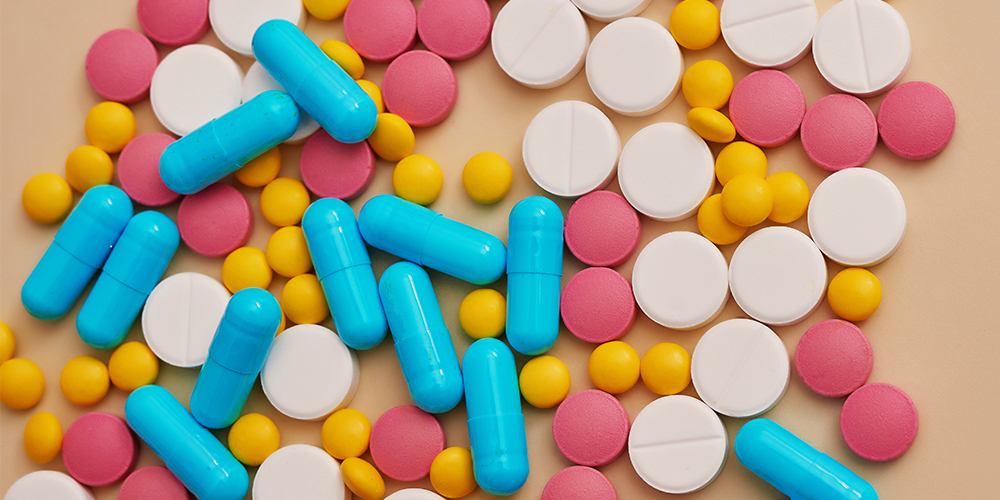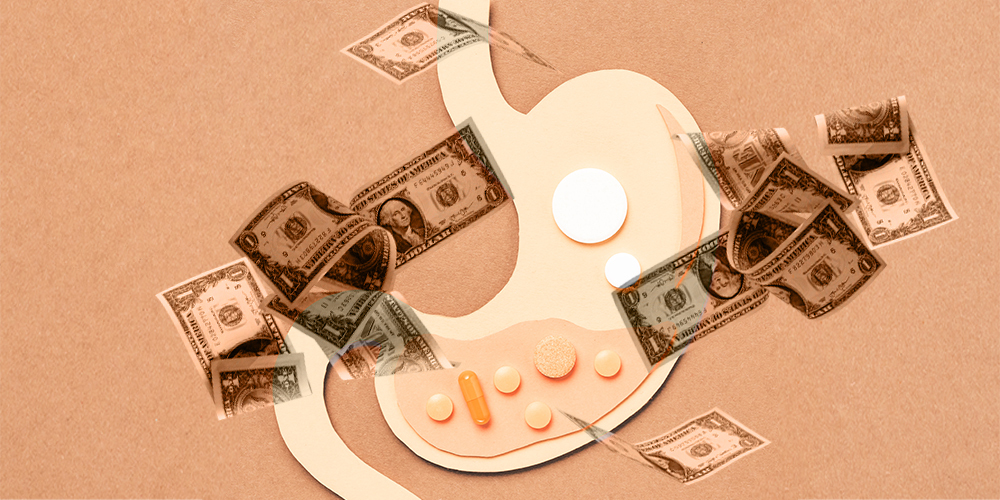We look at the growing problem of long-term PPI use and how pharmaceutical acid suppression may have gone too far.
This article was adapted from ANH International. Read the original here.
Listen to the audio version of this article here:
THE TOPLINE
- About 25 % of U.S. adults take a proton-pump inhibitor (PPI) drug, and experts estimate 60 – 70 % of those prescriptions (often continued for years) have no strong medical justification.
- Chronic acid suppression is tied to nutrient deficiencies, gut and respiratory infections, kidney disease, fractures, cardiovascular events, dementia, and even higher stomach-cancer risk—harms that compound the longer people stay on the drugs.
- Easy OTC access, hurried “just-in-case” hospital prescribing, patient demand for quick relief, and aggressive pharma marketing all fuel overuse despite proven natural methods for addressing digestive issues.
Over 20% of people in the US are said to be suffering from acid-related disorders such as acid reflux, stomach ulcers, indigestion, heartburn and gastro-esophageal reflux disease (GERD). In the past, these conditions were managed long-term with antacids to neutralize stomach acid, special diets, H2 blockers, and in serious cases, surgery. The arrival of proton pump inhibitors (PPIs) to actively reduce the amount of stomach acid produced was hailed as a medical breakthrough. Their effectiveness, safety and affordability quickly made them a staple in gastrointestinal care, with drugs like omeprazole ranking among the most prescribed drugs in the US and across the world (here and here). An astounding 25% of adults use a PPI.
However, what might have been seen as a groundbreaking solution has, in recent decades, escalated into a growing public health crisis. PPIs are too often prescribed for long periods – even when there is no strong medical reason for this extended prescription – and are rarely reviewed or stopped. Of the 25% of adults using a PPI, 25% use them for over a year and 28% for more than 3 years.
This has led to a pattern of overuse and dependence among people, drawing comparisons to the opioid crisis. Over the years, we’ve reported on an ever-expanding list of serious side effects related to PPIs:
- Numerous studies have linked long-term PPI use to serious health risks, including vitamin and nutrient deficiencies, kidney disease, bone fracture, infections, even an increased risk of stomach cancer and worse.
- Several studies show that chronic PPI use disrupts multiple physiological systems. By suppressing stomach acid, which is essential for proper digestion and gut function, as well as a natural defense against pathogens, long-term users face a 74% higher risk of gut infections like clostridium difficile and increased risk of pneumonia (here and here).
- An observational 2021 study published in the Mayo Clinic of Proceedings found that regular long-term users of PPIs of more than 5 years had over double the risk of cardiovascular disease and heart failure than non-users. Even short-term users (1 day to 3.8 years) had a 20-25% increased risk. Adding insult to injury, many didn’t even meet the criteria for taking them in the first place.
- PPIs interfere with the absorption of key nutrients leading to vitamin B12 deficiency, magnesium deficiency (hypomagnesemia), and iron-deficiency anemia, which are particularly dangerous for elderly patients already taking multiple medications.
- Another study linked PPI use in people with Type 2 diabetes with an increased risk of cardiovascular events and mortality.
- ANH-USA submitted a Citizens Petition to the FDA calling for the addition of a pneumonia warning on all PPIs.
- A large study published in JAMA Neurology found PPIs to be linked with dementia and Alzheimer’s disease. The study found that regular use of PPIs increased the risk for dementia by as much as 52% compared with nonusers.
- Important research has also found that PPIs shut off acid pumps not just in the stomach, but in every other cell of the body. This interferes with the way cells make energy and detoxify.
Making matters even worse, these drugs are overprescribed and often ineffective. Public health experts have said between 60 and 70% of people who take these drugs don’t need them or should try diet and lifestyle changes first. Other research has found that PPIs help just 1 in 25 patients.
So, to sum up: PPIs are used by tens of millions of Americans, they come with a laundry list of side effects that seems to grow significantly every year, they do not address the root cause of digestive issues, and most people using them don’t really need them. Just bu$iness as usual in our broken healthcare system!
Unravelling The Causes Of PPI Overprescription
Poor gut health is endemic in the developed world due to wrong diets, low dietary diversity, and increased consumption of junk, processed, and ultra-processed foods. This, in turn, creates consumer demand to assuage a gut on fire. From the doctors to the people demanding a magic bullet solution, to Big Pharma wanting to cash in, each group plays a role in the unchecked long-term use of a drug originally intended for short-term relief.

For example, over the counter (OTC) PPIs are recommended for occasional heartburn in short 14-day courses, up to three times a year. However, many individuals take them indefinitely for general digestive discomfort, unaware of the risks or how to address the real causes of their digestive woes. Bringing PPI use to an abrupt stop can also trigger a temporary rebound acid production, which makes people think they still need the medication, fueling ongoing dependence (here and here).
Physicians also contribute significantly. In busy clinics and hospitals, doctors prescribe PPIs by default, especially when the diagnosis is uncertain or when patients demand quick relief. Many prescriptions are written during hospital stays as a preventive measure, then carried on indefinitely after discharge without proper review (here and here), simply because they are considered ‘safe’. Alarmingly, research shows that up to 70% of physician-prescribed PPIs were made without a solid medical reason (here, here and here), and as many as 43% of non-critical patients receive them unnecessarily.
Drug companies further add to this crisis through their aggressive marketing and incentivized prescribing for doctors (here and here). A 2021 study confirmed a direct link between industry payments to doctors and rising prescription rates, with the payments preceding the increase. This commercial push has inflated healthcare costs and reinforced a cycle of overuse across the system.
How Do You Remedy Acid Reflux (GERD) Naturally?

Our bodies have been designed around the ability to consume food, break it down, digest it and liberate the nutrients. It’s the most natural thing in the world so it stands to reason that there are many natural ways to support digestion and maintain an optimal pH. Yes, it’s tougher in the modern world with all our new-to-nature foods, chemicals, toxins and overwhelming load of stressors, but it’s still possible when you know what to prioritize.
Here are some key pointers to bear in mind:
- First and foremost, if you’re a user of PPIs and would like to come off them, please don’t do this alone. Please do this with the help of an appropriately trained health professional and talk to your doctor. It is possible to come off them, but needs to be done slowly, whilst introducing a new support system for your digestive tract.
- A good nutritional program is essential – high plant food-based diet, with plenty of vegetables (as per our book, Reset Eating), while not ignoring good quality proteins and healthy fats. Starchy, refined, sugary carbs are not your friends and need to be ditched!
- Citrus juice (e.g., lemon) in hot water, is at least as effective as sodium bicarbonate to treat metabolic acidosis. Start your day with some fresh lemon in hot water. Lemon is a natural source of citric acid, which is an acidic compound. However, once it’s been metabolized through your digestive tract, the citric acid is converted into the alkaline compound, sodium citrate, which has an alkalizing effect on your body.
- If you’ve been taking antacids, as against PPIs, try a tablespoon of raw apple cider vinegar in a small amount of tepid water half an hour before eating to boost your stomach acid and assist digestion.
- Stress management is not just key to supporting good digestion, it’s critical:
- Try getting out in Nature on a regular basis and explore some forest bathing
- Get some quality ‘me time’ with some regular mindfulness and a guided meditation journey or two
- Exercise outdoors rather than indoors to lower inflammation and increase stress release – we’re still being powered by our hunter/gatherer genome and indoor gyms just don’t have the same health benefits.
- Incorporate activity that focuses on breathwork like yoga or Pilates to build better lung function and a properly functioning diaphragm.
- Did you know that humming tones the vagal nerve for better gut/brain connection and neural signaling? That’s why since time immemorial yogis, holy orders and groups have come together to chant and sing. It not only allows you drop into a deeper connection with yourself and the Divine, but is also good for your health. Singing – on your own or in a group, is wonderful for lung function as well as stress management.
- Prioritise sleep:
- Visiting a musculo-skeletal/physical/manipulative practitioner e.g. an osteopath, chiropractor, cranial sacral therapist, to ensure that you have proper skeletal and muscle alignment in your chest area and no impingement on the diaphragm.
- Mindful eating. Take time to cook from scratch to get those digestive juices going, then eat at the table and take time to chew each mouthful thoroughly to savor the food you’re eating and give your body time to produce plenty of acid and enzymes to digest your food properly.
- There’s a wide range of herbs, enzymes and other supplements to support good digestive function. It’s always best to consult with a nutritional practitioner who can advise on the best support for your particular needs and also run some functional tests to individualize your protocol.
- Here are a few safe (use as directed on pack) and easily available digestive food/dietary supplements to support stomach acid production and good digestion:
- Digestive bitters – a collection of bitter herbs used for hundreds of years to stimulate good digestion and in particular, production of digestive enzymes.
- Digestive enzymes – additional support for your own enzymes in a capsule.
- Betaine hydrochloride (HCl) – this is naturally derived from beets and helps to breakdown food in the stomach like your own stomach acid. Start at the lowest dose and work up if you need additional support. Often labelled to take it at the start of a meal, Meleni was given a tip a number of years ago by Dr Bob Marshall of Premier Research labs (now deceased) to take it just after you’ve finished a meal and it’s been so effective that she’s followed his advice since. See what works best for you, as per the label or just after, it’s a great supplement to support good digestion at the start of the digestive tract.
- Zinc – making sure you have adequate zinc levels isn’t only good for your immune system, it’s an essential co-factor in making stomach acid too.
- A teaspoon of good quality honey in warm water or chamomile tea can be helpful for heartburn as it coats the esophagus. It’s widely used in Ayurveda for esophagitis because it’s so anti-inflammatory.
- Lastly, use plenty of fresh herbs and some spices in your cooking to support digestion e.g. rosemary, fennel, ginger, turmeric, peppermint, oregano, basil and garlic. Drinking infusions of ginger, fresh turmeric and herbs between your meals is also helpful. Nature’s medicine cabinet is there to be explored!
Please share this article widely, especially among friends and relatives in your network who suffer from gastric reflux or have been taking PPI drugs long-term.




